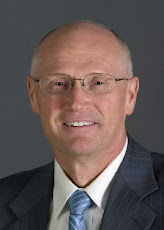I did not realize the full impact of the "public option" being proposed in the House Bill 3200 until I heard Ben Taylor with the US Chamber of Commerce speak at last week's Town Hall Meeting held in Saline. It is being proposed as "just another option" to compete with the private insurance companies to force them to drive down costs.
Here is the truth to the situation. The Bill also will set requirements of what all health insurance plans must cover, so there can be no variation of contracts to meet specific situations - one size fits all. Consumer driven health care plans such as Health Reimbursement Arrangements or Health Savings Accounts (high deductible plans with employers paying into the employees' HSA's) will not be allowed. The insurance companies will need to compete with a subsidized plan with a "company" that has no costs of capital and which does not need to generate any profit. Further, like Medicare, the public option is expected to place limits on payments for specific procedures or services, thus shifting some of the cost of those procedures and services to others. Thus the government plan will be able to offer lower premiums (on its face a "good thing"). As a result, employers are expected to gravitate quickly to the government plan.
Currently, insurers are picking up the tab for "cost shifts" (and transfering the cost of the cost shifts to the insured). 2009 Vermont Health Care Cost Shift Analysis, February 2009 defined "cost shift" as,
“In its simplest form, one can think of the cost shift as a subsidy. The Cost Shift Task Force report stated that, from the perspective of a payer of health care costs, the cost shift is defined as: “The payment of higher prices (above cost) paid by one or more payer groups to offset lower prices (below cost) paid by other payers.” In layman’s terms, this is often referred to as “charging Peter to pay for Paul”. From the perspective of a hospital, it is a pricing mechanism used to achieve revenues to support services provided to all patients when payments from some payers do not cover the costs incurred by those patients.”
Hospitals shift costs of costs of services not paid by Medicare or Medicaid, "charity care" and "charge-offs" to those patients who can pay, primarily the insurance companies. In turn, the insurance companies increase their premiums to the buyers of insurance to cover those extra costs.
The problem with the "public option" is that as the numbers of people covered under the "public option" grows, the amount of the cost shift to private insurers will dramatically increase. At the same time, the numbers of people insured by private insurers will decrease. With fewer people picking up an ever growing volume of cost shifts, the premiums charged by the insurance companies will need to rise dramatically, making them even less competitive, driving away even more employers to opt for the "public option". In a very short time, the "public option" is likely to be the "only option".
In short, with a "public option", very quickly, the health "insurance" industry will be a single payor system run by the government. Maybe the House Bill 3200 does not immediately set up a "government takeover" of the health insurance industry, but that is likely to be the ultimate result.
Is that what we want?
Comments?
Click on "Follow Blog" on the top to receive notifications of future Blog Articles.
Click on "Share" at the top to share with your friends on Facebook, etc.
Subscribe to:
Post Comments (Atom)


No comments:
Post a Comment